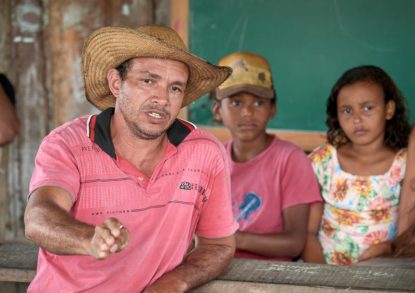
Amazon Synod
Defending Amazon against loggers, ranchers, agribusiness can be dangerous
In various parts of the Amazon, parish teams and the Brazilian bishops' Pastoral Land Commission help communities defend their land against loggers, ranchers and industrial-scale farms. The work can be dangerous, because land conflicts are often violent.
Sister Dorothy Stang helped landowners see forest through different eyes
Sister Dorothy Stang, one of a team of Sisters of Notre Dame de Namur who had moved to Anapu to accompany the farmers, had worked in Brazil since 1966 and was a representative of the Catholic Church's Pastoral Land Commission.
In the Amazon’s borderlands, ‘you have to be prepared’ for anything
The triple border shared by Peru, Brazil and Colombia along the Amazon River is a remote and lawless area that challenges the Catholic missionaries who work among its small towns and indigenous villages.
Miners, loggers, developers invade indigenous lands; isolated people die
Encounters with outsiders, followed by violence, disease and death, are a tragic pattern in the history of Amazonian indigenous people since Europeans first ventured into the lowlands nearly 500 years ago.
In Guyana’s Rupununi region, young people feel lure of city lifestyle
Roads are unpaved and often impassable, jobs are scarce and higher education is just a dream for most young people. The prospect of making a fortune in the gold fields or as a laborer on a distant ranch in the Brazilian heartland is a powerful lure.
Retiree uses music, poetry to teach respect for environment in Amazon
oseph Abraham, the son of two of the first teachers to work in Guyana's remote Amerindian villages, never went to secondary school. Yet he became a teacher and principal of the school in Hiowa.
In Amazon towns, church workers help indigenous keep languages alive
Father Ron MacDonell, a Scarboro missionary from Nova Scotia, is a linguist who helps indigenous people in the Amazon region improve their reading of the Scriptures in their own languages.
Development threatens way of life in Amazon’s Afro-Brazilian communities
Although slavery as an institution no longer exists, forms of forced labor persist in the country. And "quilombolos," as the residents of quilombos are known, still suffer from the racism and discrimination that made the brutal slave trade possible in the first place.
Struggles of families uprooted by Belo Monte reveal the dam’s dark side
Science is showing that hydropower is not as environmentally friendly as once thought. A hydroelectric dam created a huge reservoir that uprooted families and inundated the fishing grounds on which their livelihood depended.
After Amazonians migrate to cities, they struggle to survive
Poor harvests or a desire for jobs and an education drive people from rural areas to fast-growing cities, which generally are poorly planned and ill-equipped to deal with the influx of newcomers.

